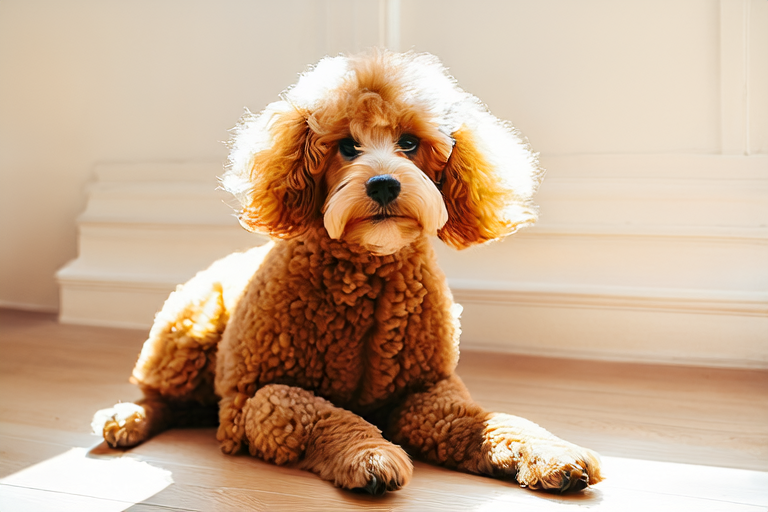Poodle: The Ultimate Guide for Pet Lovers
Welcome to the ultimate guide for pet lovers who are considering adopting or already own a Poodle. This comprehensive guide covers everything you need to know about this intelligent and elegant breed, from their origins and characteristics to training techniques and health care. Whether you’re a first-time dog owner or an experienced pet lover, this guide will provide you with valuable information to help you give your Poodle the best possible life.
Origins and Breed Characteristics
The Poodle originated in Germany but was perfected in France. They come in three sizes: Standard, Miniature, and Toy. Poodles are known for their intelligence, elegance, and versatility. They excel in various dog sports such as agility, obedience, and hunting. Their distinctive curly coat requires regular grooming, but it also makes them hypoallergenic, making them a popular choice for people with allergies.
Selecting a Healthy Poodle Puppy
When choosing a healthy Poodle puppy, look for a breeder who prioritizes the health of their dogs. Reputable breeders conduct health screenings on their breeding stock and provide health guarantees for their puppies. It’s important to ask questions about the puppy’s parents, siblings, and any genetic diseases that may run in the family. Additionally, make sure the puppy is up-to-date on vaccinations and has been socialized with other dogs and people.
Daily Care: Bathing, Grooming, and Skin Health Management
Poodles require regular bathing and grooming to maintain their beautiful coats. Bathing should be done every four to six weeks, depending on the individual dog’s needs. Use a mild shampoo specifically formulated for dogs, and rinse thoroughly to avoid leaving any residue. After bathing, dry the dog completely to prevent skin irritation. Regular brushing and combing are necessary to prevent matting and tangling. Professional grooming is recommended every six to eight weeks.
It’s essential to pay attention to your Poodle’s skin health. Check for any signs of irritation, redness, or unusual odors. A balanced diet rich in omega-3 fatty acids can help promote healthy skin and coat. Consult with your veterinarian if you notice any changes in your Poodle’s skin or coat.
Dietary Recommendations: Food Suggestions for Different Life Stages
Feeding your Poodle a balanced and nutritious diet is crucial for their overall health and well-being. The nutritional requirements of Poodles vary depending on their age, size, and activity level. For puppies, choose a high-quality puppy food that provides the necessary nutrients for growth and development. Adult Poodles benefit from a balanced adult dog food that supports their energy needs and maintains muscle mass. Senior Poodles may require a specialized senior formula that is easier to digest and contains joint support supplements.
Consult with your veterinarian to determine the appropriate portion sizes and feeding schedule based on your Poodle’s individual needs. Avoid overfeeding, as obesity can lead to health problems such as arthritis and diabetes. Fresh water should always be available.
Training Techniques: From Basic Commands to Advanced Behavior Training
Poodles are highly intelligent and eager to please, making them excellent candidates for training. Start with basic commands such as sit, stay, come, and down. Use positive reinforcement techniques, such as treats and praise, to reward desired behaviors. Consistency is key when training your Poodle. Establish clear rules and expectations, and use the same commands and cues consistently.
Once your Poodle has mastered basic commands, you can move on to more advanced training. Teach them tricks like roll over, play dead, and fetch. You can also train them for specific tasks such as therapy work or search and rescue. Obedience classes can be beneficial for both you and your Poodle, providing structured training and socialization opportunities.
Common Health Issues and Preventive Measures
Like all breeds, Poodles are prone to certain health issues. Hip dysplasia, progressive retinal atrophy (PRA), epilepsy, and sebaceous adenitis (SA) are some of the most common conditions. To prevent these health issues, ensure your Poodle receives regular veterinary care, including annual check-ups and vaccinations. Genetic testing can help identify potential health risks before breeding. Maintaining a healthy weight, providing proper nutrition, and regular exercise can also contribute to your Poodle’s overall health.
Personality Traits and Interaction with Humans
Poodles are known for their friendly and sociable nature. They thrive on human companionship and enjoy spending time with their owners. They are intelligent and can become bored easily if not mentally stimulated. Provide your Poodle with plenty of toys and activities to keep them engaged. Poodles are also known for their loyalty and protective instincts, making them excellent watchdogs.
They are generally good with children and other pets when properly socialized. However, they may be wary of strangers, so early socialization is important. Poodles respond well to positive reinforcement and gentle guidance. They are sensitive and can pick up on their owner’s emotions, making them great emotional support dogs.
Family Environment and Lifestyle
Poodles are adaptable and can thrive in various living situations. They do well in apartments as long as they receive enough exercise and mental stimulation. Daily walks and playtime are essential for maintaining their physical and mental health. Poodles also enjoy outdoor activities such as hiking, swimming, and playing fetch.
A secure and comfortable living environment is important for your Poodle’s well-being. Provide them with a cozy bed and safe toys. Consider using baby gates to prevent them from accessing dangerous areas of your home. Poodles are social animals and prefer to spend time with their families. Ensure they have access to outdoor spaces where they can explore and play.
In conclusion, owning a Poodle is a rewarding experience for those willing to invest the time and effort into their care and training. By following the guidelines outlined in this ultimate guide, you can provide your Poodle with a happy and healthy life. Remember to consult with your veterinarian for personalized advice and support throughout your journey as a pet owner.
